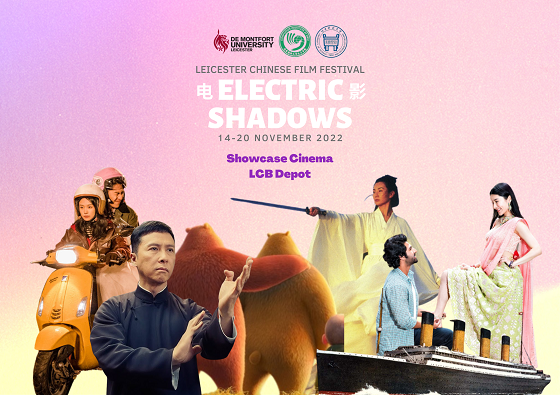This month, the Confucius Institute (CI) at De Montfort University (DMU) held the first Chinese Film Festival in the East Midlands.
The Electric Shadows Festival showcased contemporary and classic cinema from Greater China, while offering visitors Mandarin classes and a networking event at Leicester’s LCB Depot.

In partnership with UK-China Film Collab (UCFC), DMU’s CI selected seven films to promote cross cultural education, exchange and understanding.
The idea, as explained by Dr Yingjun Yang was “to develop a common ground between cultures via media, sidestepping biases by presenting culture through art.”
Dr Yang said “Connectivity is key to this festival. We share a lot in common through the human experience, we have the same needs, we understand each other. We want the world to be better, that aspiration is universal.”
“Leicester is a perfect setting for us, the mix of cultures makes everyone open to other cultures, to embrace them. The diversity makes this city beautiful.” he continued. “It’s the perfect place for the CI to share our culture with the people who study and live here.”
The festival marked two UK debuts, for “My Indian Boyfriend” and “The Italian Recipe”, highlighting the valuable international dialogues that cinema can facilitate. The films were made in partnership between Chinese, Indian and Italian filmmakers, respectively.
It also screened The Six, a documentary telling the story of the six Chinese survivors of the Titanic tragedy, which Journalism student Alfie Linville-Sibley spoke to the director Arthur Jones about below.
The Six – a review and interview with director Arthur Jones
Picture Rose at the end of the Titanic, alone and adrift on a piece of debris, eventually being rescued. That scene was likely inspired by the story of Fang Lang, a Chinese seaman aboard the Titanic, and possibly the last man to be rescued from the water.
Among the survivors of the Titanic were six Chinese men, of which almost nothing was known, save their names. A rarity, with almost all 700 odd survivors having had their names claimed, their descendants traced, and their stories marked in the annals of history.
At the time, they were accused of being stowaways, of taking spaces on the lifeboats from women and children, and summarily deported from the Manhattan docks.
VIDEO
Director Arthur Jones set out to unravel one of the last enigmas of the tragedy and reframe the narrative of the Titanic.
“I wanted to make a documentary that was more of a detective story.” Jones said. Inspired by his last documentary, The Poseidon Project (2013), another nautical story cutting across British and Chinese cultures.
“There were pieces of research online, but their stories were largely untold and unknown, even in China, when I would talk to people, they would say, what do you mean? There were no Chinese people on the Titanic.”
Jones, a Yorkshire born former journalist, now director working in China, collaborated with Steven Schwankert to research the six men, “We wanted to give the story life again, to look at it in a different way.” Jones said.
Jones and Schwankert paint a compelling narrative, beautiful and grim in equal measure, the determination and enduring dignity of the six men in the face of systemic discrimination and tragedy is inspiring, while the ugly history of anti-Chinese racism is presented unflinchingly.
The documentary, interspersed with dramatizations of the Titanic sinking, showcases Schwankert’s meticulous research , pouring over schematics, reconstructing lifeboats and passages from the ships bowels, to test the narrative that they were stowaways or thieves.
Schwankert and Jones continue to trace the six men’s stories, running strings from point to point over the globe, from England, to India, China and America. It’s a truly expansive story, stemming from just six names, it’s a triumphant feat for Jones and Co.
A truly human narrative of strength against adversity and the indomitable spirit, it washes over you, pulling you under and into the story so completely that you won’t notice the tears creeping up on you by the end. A perfect addition to Electric Shadows, a global narrative, and an eye-opening dialogue on history, international relations and cultural exchange.
Alfie Linville-Sibley.
Posted on Tuesday 22 November 2022